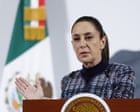
The ever-evolving landscape of international relations and policy continues to present a tapestry of complex issues and hopeful resolutions. In recent global news, we witness a mix of diplomatic efforts, legislative advancements, and significant socio-political challenges, highlighting both progress and areas for further discussion.
In a diplomatic balancing act, Mexico’s President Claudia Sheinbaum has expressed displeasure with recent actions by the United States. The U.S. has imposed sanctions on three Mexican banks, accusing them of being involved in money laundering activities tied to the fentanyl trade. President Sheinbaum has responded by demanding evidence from the U.S. Treasury Department, emphasizing Mexico’s willingness to act if compelling proof is provided. This exchange underlines the importance of transparency and cooperation in addressing cross-border illicit activities.
Meanwhile, across the Pacific, efforts to ease economic tensions have seen a positive development. The United States and China have reached a pivotal agreement to accelerate the shipments of rare earth elements to the U.S. These materials are essential for manufacturing various technologies. By reaching this consensus, the two nations strengthen their economic ties and take significant steps toward resolving ongoing trade disputes. Such cooperation signals a hopeful shift towards mutual benefit and long-term trade stability.
In the European sphere, discussions about a potential trade deal with the United States are underway. European Commission President Ursula von der Leyen has articulated the EU’s readiness to engage in negotiations while retaining all options to protect European interests. As the U.S. considers imposing steep tariffs on steel, the EU remains vigilant in ensuring that any cooperation aligns with its economic and strategic objectives. This situation highlights the delicate art of negotiation where readiness to collaborate is balanced with the defense of regional interests.
Innovation in legislative approaches emerges from Denmark, as the country pioneers new protections for individual identities in the digital realm. Furthermore, the Danish government’s initiative to amend copyright laws is designed to combat the misuse of AI-generated deepfakes. By granting individuals copyright over their faces, voices, and bodies, Denmark sets an example in safeguarding personal identity against technological misuse. This proactive measure may pave the way for similar responses in other nations, as digital impersonation becomes an increasing concern.
Shifting focus to humanitarian issues, the plight of Ukrainian refugees in the UK has come under scrutiny. Despite ongoing conflicts in parts of Ukraine, the UK Home Office has denied asylum to many Ukrainians, asserting it is safe for return. This stance raises concerns for families seeking stability, education, and security. As their home regions grapple with instability, these individuals face significant hurdles in finding a permanent settlement, underscoring the challenges in formulating humane and practical immigration policies.
In a related context, the European response to the ongoing humanitarian situation in Gaza brings to light the complex dynamics of international aid and diplomacy. European Council President Antonio Costa has emphasized the need for robust dialogue with Israel while advocating for increased humanitarian assistance to the Palestinian territories. This scenario encapsulates the continuous call for dialogues that promote peace and security across volatile regions.
As these stories unfold, it becomes evident that international collaborations and domestic policy advancements require careful deliberation, grounded evidence, and a strong commitment to global welfare. Whether it is through fostering trade relationships, enacting protective laws, or addressing humanitarian needs, the path forward is shaped by the pursuit of balanced and constructive solutions.
Source: {link}
